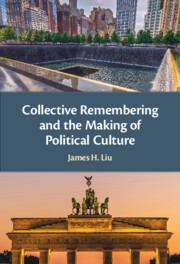Crossref Citations
This Book has been
cited by the following publications. This list is generated based on data provided by Crossref.
2023.
Publications Received.
Contemporary Sociology: A Journal of Reviews,
Vol. 52,
Issue. 1,
p.
95.
Liu, James H.
and
Xie, Tian
2023.
China's collectivist cosmopolitanism: Harmony and conflict with Western conceptualizations of cosmopolitanism rooted in individualistic notions of human rights.
Journal of Pacific Rim Psychology,
Vol. 17,
Issue. ,
Liu, James H.
Choi, Sarah Y.
Lee, I-Ching
Leung, Angela K.-y.
Lee, Michelle
Lin, Mei-Hua
Hodgetts, Darrin
and
Chen, Sylvia Xiaohua
2023.
Behavioral evidence for global consciousness transcending national parochialism.
Scientific Reports,
Vol. 13,
Issue. 1,
Bouchat, Pierre
Cabecinhas, Rosa
Licata, Laurent
Charton, Maxence
Chryssochoou, Xenia
Delouvée, Sylvain
Erb, Hans-Peter
Facca, Léo
Flassbeck, Christine
Haas, Valérie
Kalampalikis, Nikos
Franc, Renata
Mari, Silvia
Pavlovic, Tomislav
Petrović, Nebojša
Raudsepp, Maaris
Sá, Alberto
Sakki, Inari
Sekerdej, Maciek
Taranczewski, Julien
Telle, Nils-Torge
Valentim, Joaquim Pires
Wenzel, Aude
Wnuk, Anna
and
Hilton, Denis
2023.
Social representations of European history by the European youth: A cross-country comparison.
Journal of Social and Political Psychology,
Vol. 11,
Issue. 2,
p.
606.
Hodgetts, Darrin
Hopner, Veronica
Carr, Stuart
Bar-Tal, Daniel
Liu, James H.
Saner, Raymond
Yiu, Lichia
Horgan, John
Searle, Rosalind H
Massola, Gustavo
Hakim, Moh A.
Marai, Leo
King, Pita
and
Moghaddam, Fathali
2023.
Human Security Psychology: A Linking Construct for an Eclectic Discipline.
Review of General Psychology,
Vol. 27,
Issue. 2,
p.
177.
Tsygvintsev, Igor
2024.
Political Culture in the Age of Digitalization: New Research Tools.
Political Studies,
p.
137.
Choi, Sarah Y.
and
Liu, James H.
2024.
Identifying stories of ‘us’: A mixed‐method analysis of the meaning, contents and associations of national narratives constructed by Americans.
European Journal of Social Psychology,
Vol. 54,
Issue. 2,
p.
431.
Çavuşoğlu, Merve
and
Kuşdil, Muharrem Ersin
2024.
Flashbulb memories in the context of group hierarchies: effects of gender, system justification, and social dominance orientation on negative private and public flashbulb memories.
Frontiers in Psychology,
Vol. 15,
Issue. ,
Ivanović, Jovan
Vincze, Orsolya
Jevtić, Miloš
Szabó, Zsolt
Csertő, István
Choi, Sarah Y.
and
Liu, James H.
2025.
Between east and west, between past and future: The effects of exclusive historical victimhood on geopolitical attitudes in Hungary and Serbia.
British Journal of Social Psychology,
Vol. 64,
Issue. 1,



